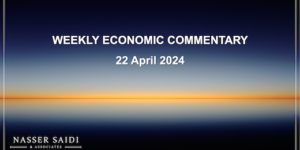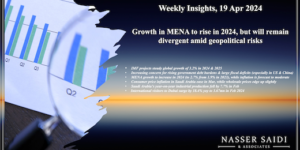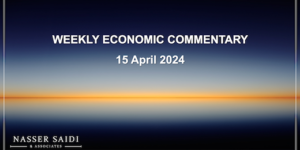Markets
Stock markets scored their worst weekly losses since June on fears of weak earnings, though macroeconomic news was broadly in line with expectations. Until the fundamentals of the US political & policy agenda, the looming fiscal cliff and euro area governance are tackled, markets will fail to gain traction convincingly and trade will be largely dominated by short-term hiccups in either direction. Regional markets were also on the back foot with most markets down compared to a week ago. The euro/dollar stabilized while the Renminbi jumped to its highest level in 19 years against the dollar. Oil prices were well supported while gold prices saw the biggest weekly decline since June.
Global Developments
Americas:
- In its Sep Beige Book, the Fed alluded to stable yet modest US economic growth with little improvement in consumer spending and employment, citing heightened short-term uncertainty over US fiscal policy as reasons for tepid hiring.
- The US trade deficit widened from USD 42.5bn to USD 44.2bn in Aug. Exports and imports both declined (by -1.0% and -0.1%, respectively). The real goods trade balance also widened, from -USD 47.0bn in July to -USD 48.4bn in August.
- Initial jobless claims fell sharply by 30k to 339k, the lowest level since February 2008. The Labor Department explained that this drop was “mainly” driven by lower claims in one state. Continuing jobless claims declined 15k, down to 3.273 million in line with consensus.
- Banco Central do Brazil cuts rates 0.25% to an all time low of 7.25% as concerns on growth mount and Argentina gets closer to the brink of crisis.
Europe:
- In its 2013 budget Italy’s government announced a 1% cut in income tax offset by a 1% hike in VAT, alongside minor spending cuts.
- S&P rattled markets by downgrading Spain’s debt rating to BBB- from BBB+ with negative outlook. Next stop junk status.
- Euro area IP surprised on the upside with a +0.6% mom (-2.3% yoy) in Aug and similar fall in July (-2.4% yoy). The German locomotive stalled with IP dropping by -0.5% mom in August after the sharp increase reported in July (+1.2% mom). Surveys point to further downward pressure. Europe is confirming it is in recession.
- Industrial production in the UK fell for the 17th consecutive month in Aug by 0.5% mom and 1.2% yoy in Aug (Jul: +2.8% mom & -0.8% yoy) while the trade deficit widened sharply in Aug to GBP 4.2bn from July’s GBP 1.7bn – both dampening growth outlook for the economy.
Asia and Pacific:
- China’s exports grew 9.9% yoy in Sep (Aug: 2.7%) and imports gained 2.4% (-2.6%) leading to a widening of the trade surplus to USD 27.67bn from Aug’s USD 26.7bn. Trade with the US increased by 9.1% during the Jan-Sep period while trade with the EU fell 2.7%.
- As a measure of further fiscal stimulus, China will provide CNY 2.5bn (USD 398 mn) in loan subsidies to importers of advanced technological equipment and raw materials. This year’s funding marks an increase of 25% over last year.
- Japan’s current account balance increased for the first time in 18 months, by 4.2% to USD 5.8bn in Aug, on higher overseas investment income.
- Japan’s new machinery orders index, an indicator of recent corporate capital spending, slipped 3.3% in Aug (+4.6% in July). The decline signals expectations of lower external demand.
- South Korea cut its benchmark interest rate by 25 bps to 2.75% as it adopts further monetary easing to combat slowing regional growth.
- India’s trade deficit widened to an 11-month high of USD 18.1bn in Sep as exports contracted for the fifth consecutive month (-10.8% yoy). Meanwhile, industrial production activity picked up modestly in Aug, rising 2.7% yoy after registering a decline of 0.2% in Jul, on rise in consumer goods production.
- Singapore’s GDP grew 1.3% yoy in Q3 against 2.3% in Q2, while the central bank left interest rates unchanged against expectations.
Bottom line: The downward revision of the IMF’s global growth forecasts merely confirmed what everybody already knew: on unchanged policies the economic weakness & financial wilderness that characterized 2012 will extend well into 2013. The global economy is sinking into a downward spiral from where it can only be rescued by decisive political action and bold choices that wipe out the entrenched vested interests which weigh on the public coffers sapping new investment and hiring.
Regional Developments
- Iranian oil output hit a 23 year record low as a result of US and European sanctions the International Energy Agency reported, leading to a decline in international reserves & the Rial.
- Core CPI inflation in Egypt dropped to 3.8% yoy in Sep – a rate not seen since mid-2006, despite a 9.3% yoy increase in food prices.
- Egypt vowed to scale back energy subsidies by 30% in fiscal year ending June 2013, in an effort to secure a USD 4.8 bn loan from the IMF.
- Egypt’s foreign reserves declined to USD 15.04bn in the end of Sep from USD 15.13bn in Aug, though it remains unclear if this includes the recent aid received (and/ or disbursed) from Saudi and Qatar.
- Amid rising tensions between Iran and the west and numerous threats by Iran to block the Strait of Hormuz, Oman is considering building an oil storage facility near Duqm with a capacity of 200 mn barrels.
- The Iranian central bank (CB) will be issuing some USD 8.2bn (100 trillion rials) in bonds in the year ending Mar 20, 2013. The first phase of 25 trillion rials (was to be issued on Oct 13) will be offered to the public. Meanwhile, the Head of Iran’s Chamber of Commerce Industries and Mines announced that the CB had sold about USD 27bn in the first six months of the Iranian year, implying volatility in the currency market.
- The IEA forecast Iran’s oil output to double by 2020, hitting 6.1mn barrels a day, but the Agency cautioned that political obstacles and infrastructure bottlenecks could impede the sector’s growth.
- Following the dissolution of the previous Parliament, the King of Jordan has appointed Abdullah Ensour as the PM in the run-up to parliamentary elections, which must be held within the next four months.
- Jordan’s Ministry of Finance revealed a widening of public debt to about JOD 15.7bn in the first eight months of this year from JOD 13.4bn in the end of 2011 (+17%). A breakdown of debt showed that borrowing from local banks had increased more than JOD 2bn while loans from international lenders were up by around JOD 300mn.
- Kuwait’s Finance Minister announced a transfer of USD 250mn to the central bank of Jordan, as its contribution towards the USD 5bn grant agreed by the GCC last year.
- The executive president of the central bank of Oman announced that the regulatory framework for Islamic banking had been finalised and that changes to the Banking Law are ongoing. He also mentioned that banks should be in a position to comply with Basel III by end of 2013.
- Higher oil revenues outweighed the increase in public expenditure during the period Jan-Jul, resulting in a rise in Oman’s fiscal surplus by almost five times to OMR 2.04mn.
- Tourism in Saudi Arabia is expected to create about 1.1 million direct and indirect jobs by 2016 at a growth rate of about 25%, as per the executive manager of Saudi Commission for Tourism and Antiquities.
- IMF estimates reveal that foreign assets in Saudi Arabia will exceed one trillion by 2015, with higher oil prices and crude oil production leading to a surge in net foreign assets by nearly USD 166bn to USD 701bn in 2012.
- Oil producers in the Middle East have planned to invest almost USD 740bn in energy projects in the coming five years, according to Arab Petroleum Investments Corp. Saudi Arabia tops the list with an estimated USD 165bn in investment commitments, followed by UAE and Algeria at USD 107bn and USD 71bn respectively.
- M&A activity in the Middle East doubled to USD 15.7bn in the first 9 months of this year, with UAE emerging as the most active country with close to USD 4bn in deals and with the telecommunications sector witnessing the maximum value of deals at USD 6.4bn. (Source: Reuters)
- The GCC project to link electricity grids has been successful and beneficial, with more than 600 megawatts exchanged among the nations last year, according to a press statement released after the meeting of the cooperation committee on electricity and water.
- A S&P report on GCC Sukuk issuance showed that in the period Jan-Sep 2012 total issuance exceeded USD 19bn – this was higher than the 2011 total and also was higher than the value of total conventional bond issuances during this period given tightening yields. S&P also revised upwards its forecast for GCC growth in 2012 to 5% from the previously estimated 4%, citing higher oil revenues.
UAE Focus
- Money supply (M3) in the UAE grew 2.6% yoy in Aug, after four consecutive monthly declines. Bank lending growth retreated to 3.2% yoy from a seven-month peak of 3.7% yoy in Jul. The UAE central bank’s foreign currency assets rose to AED 189.1bn ($51.5 billion) in Aug from AED 186.8bn in Jul.
- The CEO of NBAD announced that it had secured a 6-month extension from the UAE central bank to comply with lending caps to government-related entities, which was unveiled last April. Meanwhile, the Chief Executive of Noor Islamic Bank stated that not only was it “logistically difficult” but also that it would take close to three years to comply with the new regulations.
- UAE’s non-oil exports increased 9.7% to AED 209bn from end-2011; total foreign trade touched about AED 81.8bn in April, with AED 52.7bn in imports, AED 12.5bn in exports and AED 16.6bn in re-exports. Bilateral trade between the UAE and Saudi Arabia (largest trade partner in the GCC) increased 5.7% yoy to AED 320.3bn in the Jan-Apr period.
- Limitless restructured its USD 1.2bn loan successfully, having cleared obligations to 92% of trade creditors and hence concluding two year long negotiations. The company will, from now on, be owned by the Dubai government.
- A hike in food prices led to a rise in Abu Dhabi’s inflation; for the first nine months of 2012, prices were up 1.3% yoy and food prices accounted for about 55.5% of the change.
- The central bank confirmed that the National Bank of Fujairah replaced Barclays, after its voluntary withdrawal, on the Eibor fixing panel.
- Zabeel Investments, which has been in the news for the past few weeks, has settled a USD 107.13mn legal claim that ADCB had filed against it.
- Alpen Capital’s report on the UAE’s hospitality sector estimates that revenues will increase 8.9% yoy to USD 4.9bn in 2012, and it will eventually grow to USD 7.5bn by 2016.






